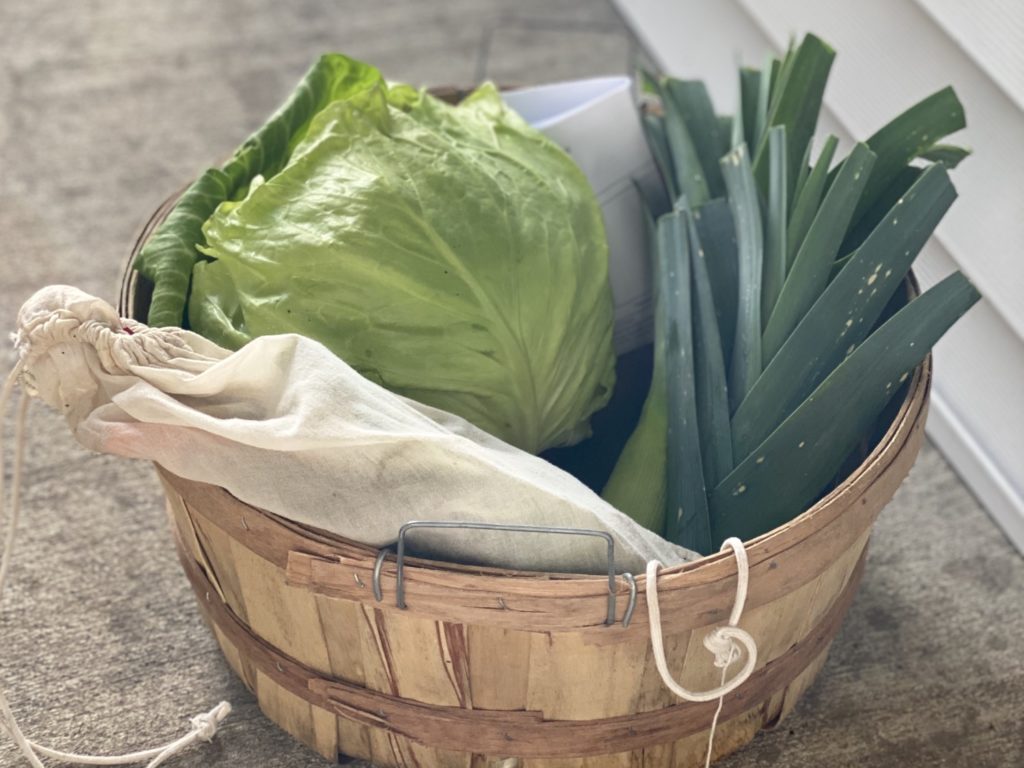
Can we talk about cabbage? Ok before you click away, hear me out. While there are truly so many things to love about these versatile, slightly sweet, crunchy leaves, I often cringe a little when my CSA farm basket shows up with a gorgeous, hearty head of cabbage. I hate to admit it, but of all the amazing produce our farmers grow, cabbage is the one thing I have the most trouble using. This post with 6 of my best tips for using cabbage is as much for me as it is for you.
I’m not sure why cabbage presents such a challenge for me, because I actually like it! Perhaps it’s the sheer size of them? It’s easy to find recipes for cabbage on the vast internet database, but so many of them call for a few cups or “half a small head.” The nearly five-pounder I received this week produced about 16 cups of shredded cabbage! Sixteen cups!!
It seemed only fitting that as I continue to share tips for cooking your way through your CSA or farmers’ market haul, that we address the brassica in the room. What it is, how to prep it, and my favorite ideas and tips for cabbage, all 16 cups of it.
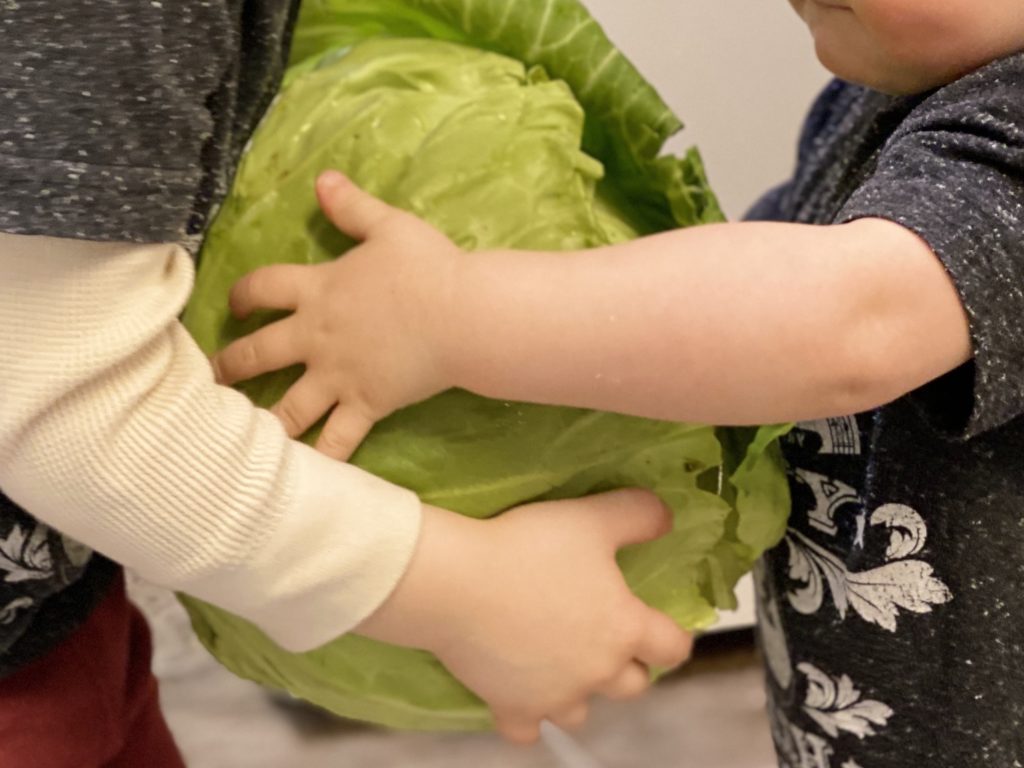
All About Cabbage
While there are over 400 varieties of cabbage, we primarily see 4 in the US: green, red/purple, savoy, and Napa/Chinese cabbage. (Source)
Most of us are probably best acquainted with green cabbage, which is green on the outside and whitish inside. It is smooth and round with compact leaves. Red or purple cabbage is about the same but is, you guessed it, reddish or purple. They can be used basically the same way, but purple cabbage is a little less tender.
Savoy cabbage is darker green and round with crinkly leaves and tends to be a bit sweeter. And Napa cabbage is oblong shaped with crinkly leaves. (Side note, both Napa cabbage and bok choy are sometimes called Chinese cabbage, but they aren’t the same thing.
While each variety has its own special characteristics, I tend to use the different cabbages interchangeably at home. You can eat all of them raw or cooked: sautéed, roasted, boiled, steamed, braised, fried, stewed…even pickled or fermented! Basically all the ways.
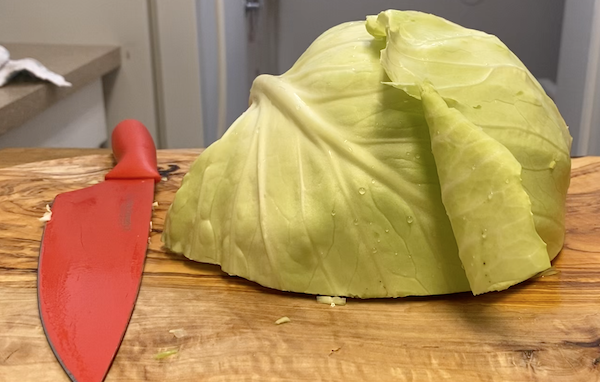
Save a Little Money, Live a Little Greener
Cabbage is also a super frugal buy. An organic head of cabbage runs about $1/pound, which is a lot of bang for your buck. If you’re choosing one from the store, pick one that is heavy for its size and appears firm and fresh. Store it in your crisper drawer (if it fits). I like to keep it in a reused plastic bag if possible, but I don’t think this is strictly necessary. Uncut red and green cabbage will keep for several weeks or so.
Now, listen. I do understand the convenience of the pre-shredded, plastic bagged, cabbage and slaw mix. Really, I do! I have admittedly bought it myself. But, I want to challenge you to buy the whole vegetable, sans non-recyclable extra plastic packaging waste, sans convenience surcharge. For the earth and for your pocketbook!
More to Love: an Impressive Nutritional Profile
Cabbage is a low calorie powerhouse chock full of fiber, vitamin k, vitamin c, B6, and antioxidants among many other things. It’s pretty impressive! If you need more convincing, check out this great article from Healthline.com for a comprehensive breakdown.
Alright. So, back to my challenge. Let’s just say someone leaves this monster vegetable on your doorstep. What now?! Here are my best tips for using cabbage, lots of it.
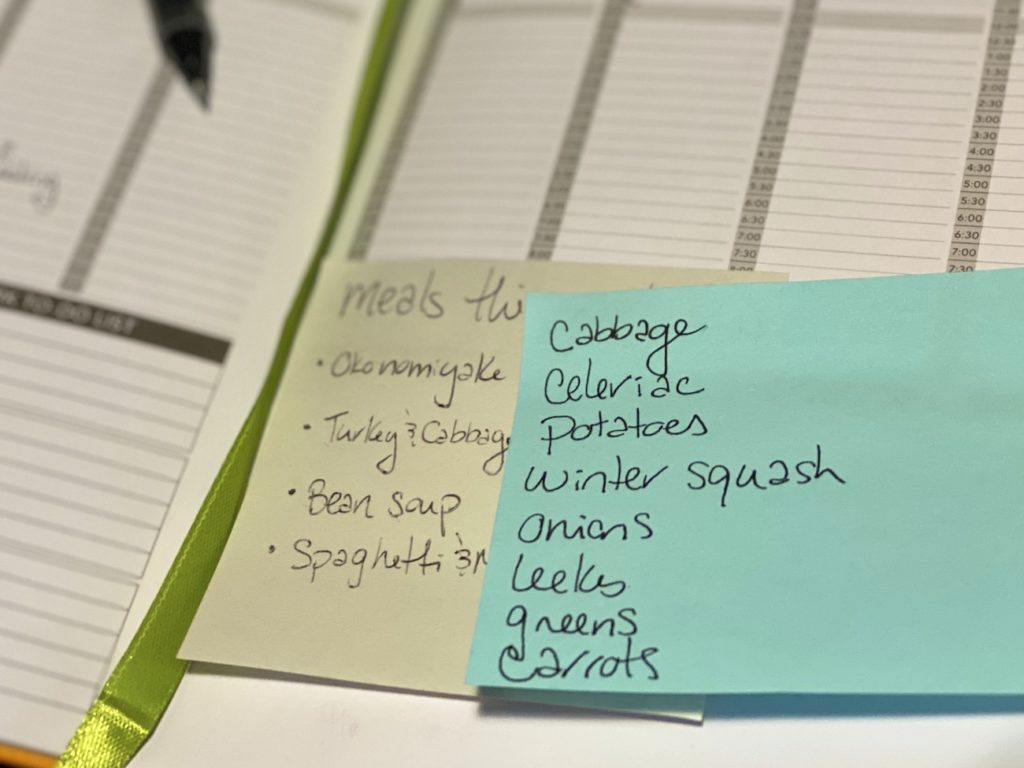
Cabbage Tip #1: Reverse Engineer Your Meal Plan
This is a strategy that I use every single week and is extremely useful for cooking your way through a CSA or subscription produce box. When I receive my basket, I start by making a list of what I now have on hand -on actual paper, not my phone. It’s an inventory that I use to strategize my meal plan, working in reverse. Then I post it on my fridge so that veggies don’t get forgotten in the depths of the crisper drawer.
With an average sized or large head of cabbage, you will have plenty for several cabbage-heavy meals and sides.
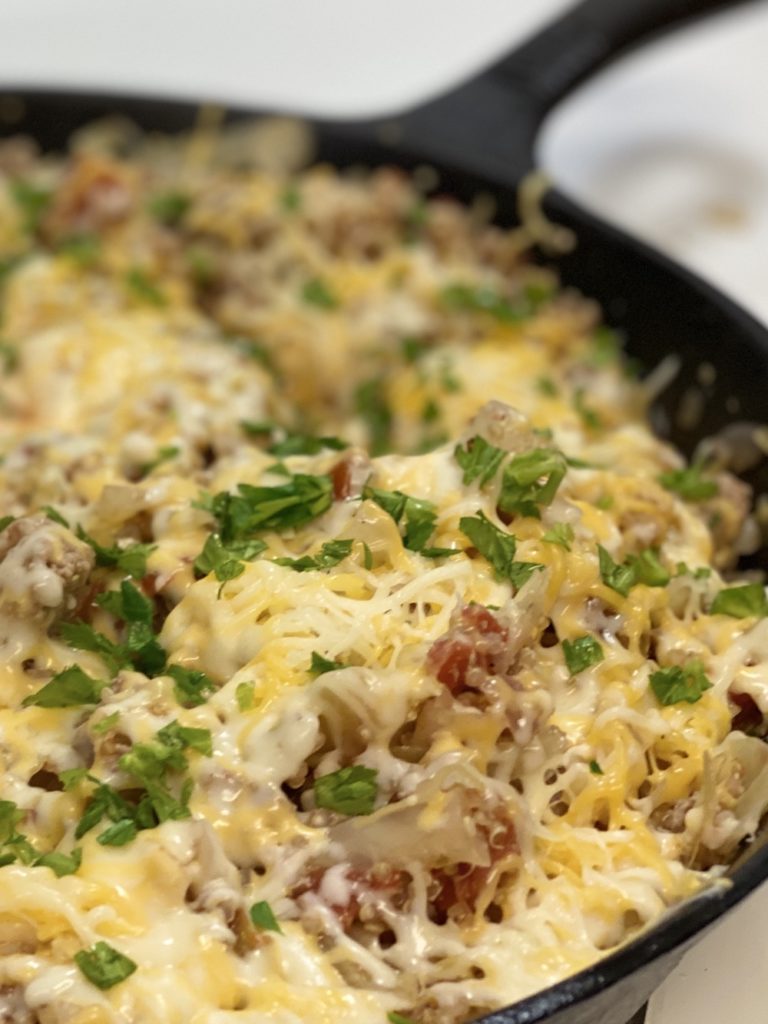
This is one of my very favorite cabbage recipes that uses A LOT of cabbage, adapted from WonkyWonderful.com. What’s so perfect about this is that you can really add in whatever else you need to use up. I have made this many, many times, and generally sub in quinoa for rice (because I don’t tend to cook with very much rice out of concern for its arsenic content.)
Here is my modified version of this very tasty, cabbage crushing, skillet meal… One-Pan Unstuffed Turkey, Quinoa, Cabbage Roll!
One-Pan Unstuffed Turkey, Quinoa, Cabbage Roll
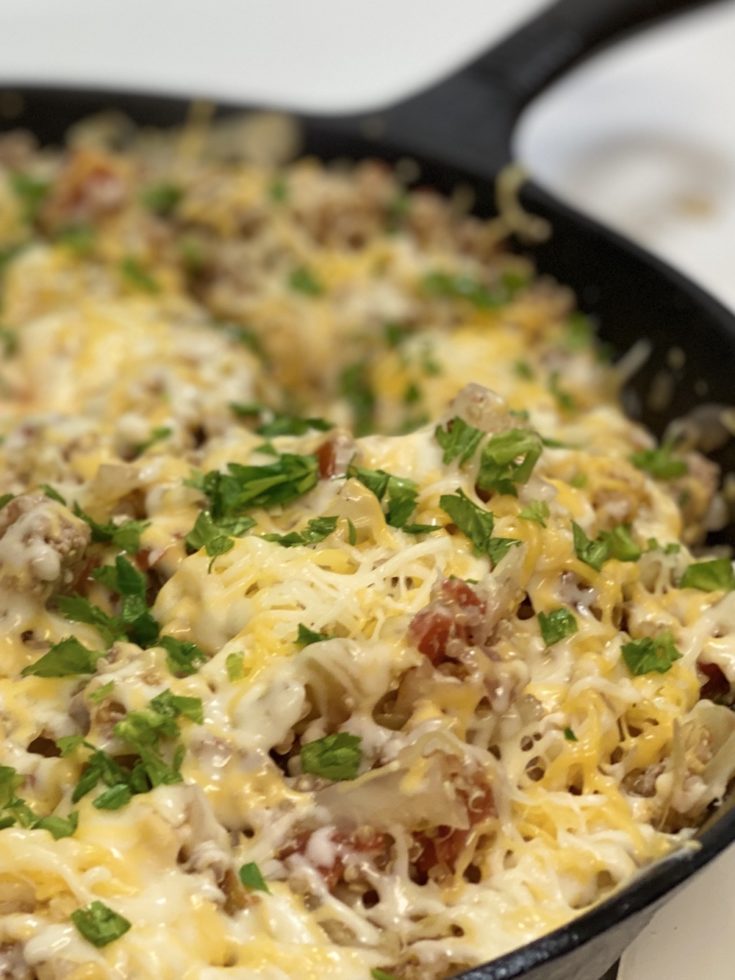
Delicious and versatile, this healthful one-pan meal is a great crowd pleaser that makes use of lots of cabbage (and other veggies you've got on hand!) Adapted from https://wonkywonderful.com/easy-stuffed-cabbage-casserole/
Ingredients
- 1 lb organic ground turkey
- 2 T Extra Virgin Olive Oil
- 1 small onion or leek, chopped
- 1 medium carrot, chopped
- 1/2 cup celeriac, chopped
- 1 tsp garlic powder
- 1/2 tsp onion salt
- 1/4 tsp dried thyme
- salt and pepper to taste
- 14-15 oz can of fire roasted diced tomatoes, UNdrained
- 1 1/4 cup water
- 1 cup quinoa, rinsed
- about 5 cups of shredded cabbage
- about 2 cups shredded cheese (cheddar, colby, pepperjack, etc)
- 1/4 c chopped celeriac leaves or parsley
Instructions
- Heat oil in a large skillet or dutch oven at about medium. Add onions or leeks and saute for a few minutes with a sprinkle of kosher or sea salt. Add ground turkey and cook until mostly browned. Add carrots, celeriac (or other vegetables of your choice: peppers, parsnips, beets, celery, zucchini, etc.) Add seasonings.
- Next add diced tomatoes, undrained, and about 1 1/4 cup of water to the pan. Stir in 1 cup of quinoa and bring to a boil.
- Add the cabbage on top, reduce heat to a simmer, cover, and cook about 20 minutes, stirring occasionally until the quinoa is cooked. Adjust salt and pepper to taste.
- Top the whole skillet with about 2 cups of cheese and cover for a few minutes to melt. Garnish with a sprinkle of fresh celeriac leaves or parsley. (OR add cheese and herbs to each individual bowl when served to adjust for dietary preference!)
Cabbage Tip #2: Make it Easy to Use
In order to maximize my fresh CSA produce, it’s gotta be easy to use. Which means ready to go. I like to do as much of this kind of prep as possible on the weekends when my husband is around to help with the littles. If you have never dealt with a whole head of cabbage before, here’s a little video with some tips on how to chop it up to get you started.
Admittedly, cabbage is a little tricky like this. The easiest way to use it tends to be in shreds. Butchering it up can be a little time consuming, especially when you are rushing to get food going on a Tuesday night. And while a whole head of cabbage stores well for several weeks in a plastic bag in the fridge crisper, pre-cut cabbage goes bad much faster, within a few days.
So this is something of a compromise. I prefer to go ahead and prep it ahead of time and cook as much of it towards the beginning of the week as possible. (Then I gain a few extra days to use up the leftovers later in the week and for lunches.) What I can’t use up can be easily frozen. Which leads me to…
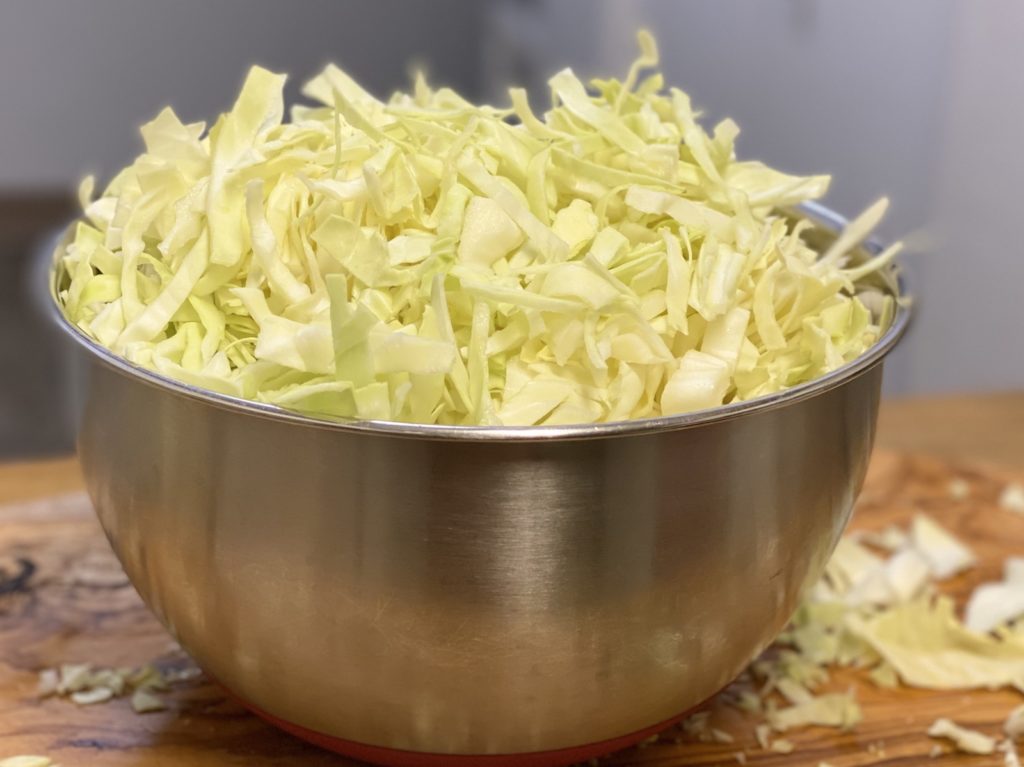
Cabbage Tip #3: Use What You Can and Preserve the Rest
There are several ways to preserve cabbage. The most popular are obviously sauerkraut and kimchi. But I am going to be totally honest with you here. Much to the dismay of my husband, I don’t really care for either of these foods! But I hear cabbage is quite simple to ferment if you wanna give it a try!
How to Freeze Shredded Cabbage
If you have done your best to cook up your cabbage, but it just ain’t happenin’, it’s super simple to freeze. Blanch shredded cabbage in boiling water for 90 seconds, then dunk it into an ice bath for a few minutes to stop the cooking process. Next, drain and pat the shreds dry. Pack the cabbage in freezer bags and stick ’em in the freezer to use later in stews or other cooked dishes. (They will not be as crisp upon defrosting, so it’s best leave the slaws for your fresh cabbage.)
Cabbage Tip #4: Let the Cabbage Steal the Show
I’ve said it before, I will say it again, let the veggies be the star of the show. One of my favorite recipes for cabbage is based on a popular Japanese dish called Okonomiyaki, cabbage pancakes. They are filling, flavorful, and they use a ton of cabbage!
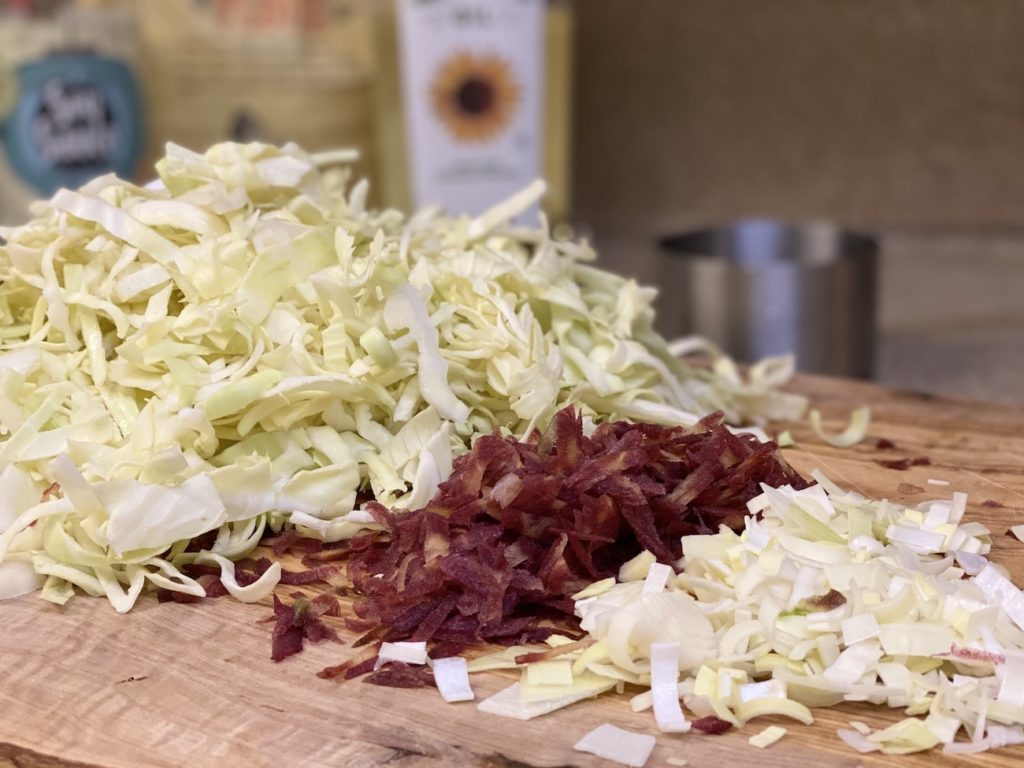
I love this version from BudgetBytes.com. What’s great about this idea is that you can throw in other vegetables you happen to have on hand. The “pancake” batter calls for 4-5 cups of cabbage plus a carrot and some green onion. I tend to make a mixture of about 6 cups total of cabbage and whatever other shredded/finely diced veggie I have around- leeks, carrots, parsnips, celeriac, zucchini, parsnips, peppers, etc.
This dish really shines with “toppings.” I love the Sweet Chili Sauce from Trader Joe’s but Sriracha Mayo or whatever sauce you like could be awesome. I’m also a huge fan of adding a runny fried egg to just about every dish I make, and it works well with Okonomiyaki, too. Also, bacon. Because, you know…bacon.
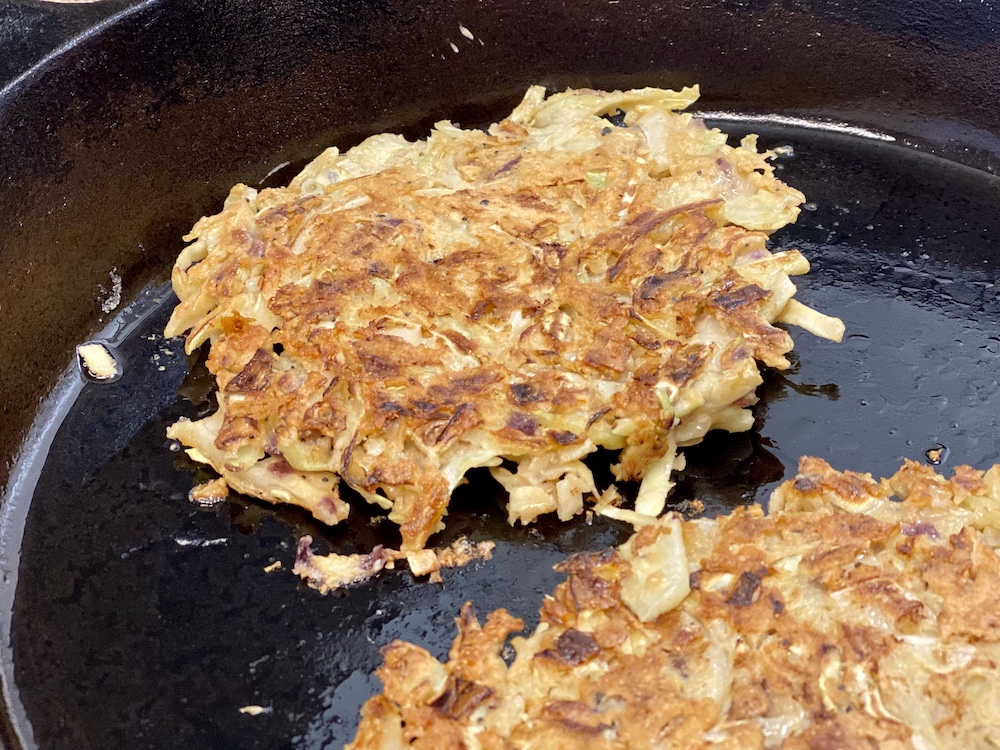
Tip #5 Add a Handful to Everything!
Cabbage is one of those sneaky veggies that can be added, at least in small amounts, to just about everything. Soups, stews, casseroles, stir frys, salads, you name it. Think of it as adding a punch of texture, a little extra crunch, to your dish. Keeping the shreds thin keeps it unobtrusive.
Tip #6 Keep it Simple
Cabbage doesn’t need complicated recipes to shine. Because this ultra-versatile veggie can be cooked all the ways, sometimes keeping it simple is best. I’ve shared this cabbage tip before, but it deserves repeating: I think my very favorite way to eat cabbage is roasted. You can roast it in steaks, wedges, and shreds, just adjust the cooking time. It’s lovely as a side, in grain bowls, or in a roasted cabbage slaw. Here’s a video clip of how I like to go about it.
I also really love this super simple cabbage sauté. Nothing fancy, just some good ole butter and salt and pepper.
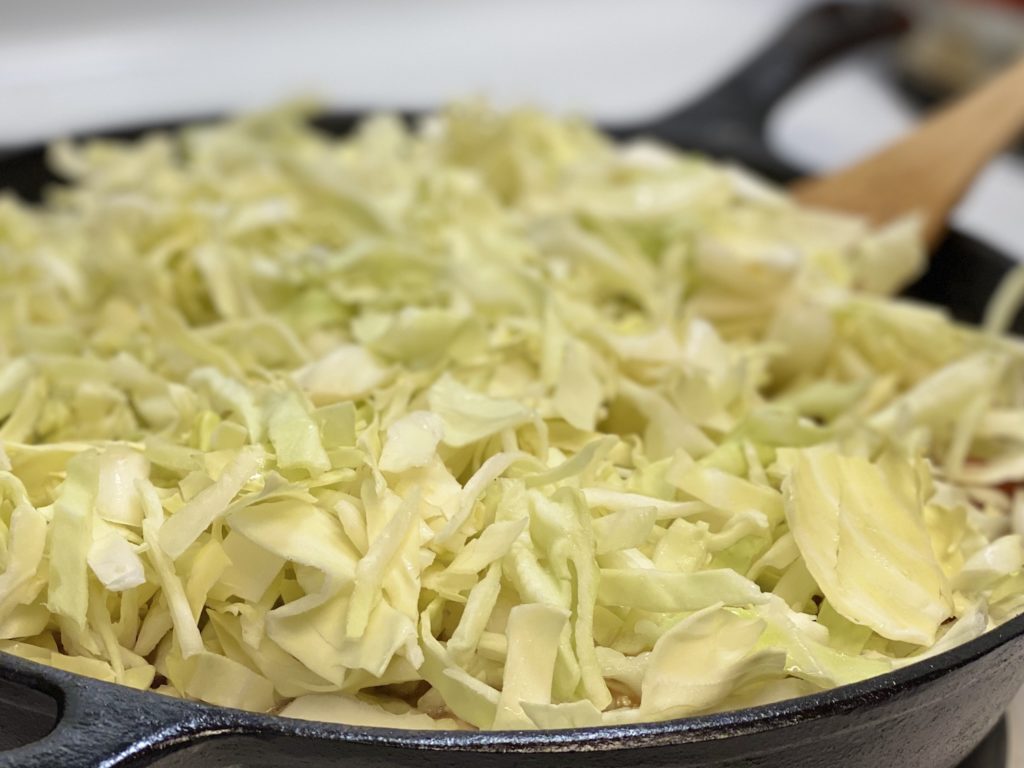
What would you add to this list of tips for using cabbage? I would love nothing more than for this and all the other CSA tips posts to serve as a community resource! Please feel free to add your own tricks and link to your favorite recipes!
I love cabbage. Thanks for these fabulous ideas! I can’t wait to try the cabbage pancakes with runny egg and bacon. Yum! And that one skillet dish, sounds amazing. Thanks for doing my meal plan for me this week! 😉
I got you, Jenn! Thanks for reading- lemme know how you like them!
Am staring at a fridge full of cabbage. Thanks for the ideas! I never thought to freeze it before.
I know that feeling… I’m so glad you found it useful!